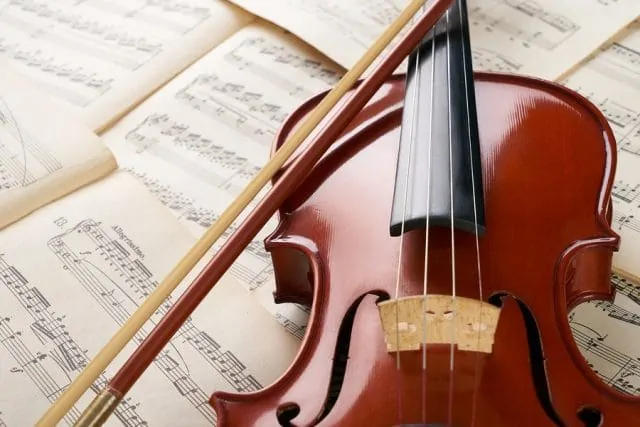In this article, we will learn how to say “music” in Korean. After all, in every shop and restaurant that you go to, and in every show on TV or movie you watch, you hear some sort of music being played.
Many people love to listen to music on their phones or iPods while on their commute, on the radio when driving, or on the stereo at home. Not to mention how K-pop has become a worldwide sensation (thanks to bands like Blackpink, BTS, and many more). In other words, music is a big part of most people’s lives.
Thus, learning how to say “music” in Korean will likely be a good enhancement to your Korean vocabulary. Today you’ll learn just that!
Contents
- 1 “Music” in Korean
- 1.1 “Sheet music” in Korean
- 1.2 “Song” in Korean
- 2 A word of caution about Romanization
The first and most basic word for “music” to learn in Korean is 음악 (eumak). This word is the general word used when discussing music.
If your hobby happens to be “listening to music,” you can describe it with the word 음악듣기 (eumakdeutki). This word is shortened from the Korean verb “listening to music,” which is 음악을 듣다 (eumageul deutda).
The word 곡 (gok) also means “music,” but it is used more as a word that describes a specific song, or the instrumental music in a song, rather than just music generally.
Sample Sentences
악보를 읽을 줄 아세요? (akboreul ilkeul jul aseyo?)
Do you know how to read music?
대학교에서 음악을 공부해요. (daehakgyoeseo eumageul gongbuhaeyo.)
I study music at university.
요즘은 음악을 잘 안듣고 있네요. (yojeumeun eumageul jal andeutgo itneyo.)
These days I don’t really listen to music.
난 K팝 음악 좋아해. (nan keipab eumak johahae.)
I like K-pop music.
나는 대학교 음악 동아리 다녀. (naneun daehakgyo eumak dongari danyeo.)
I participate in the university’s music club.
어떤 음악을 좋아해? (eoddeon eumageul johahae?)
What kind of music do you like?
Want more Korean phrases? Click here for a complete list!
“Sheet music” in Korean
악보 (akbo) is another word that means “music.” However, in this word’s case, it is used specifically to refer to “sheet music.”
“Song” in Korean
Following that, another similar word for “song” in Korean is 노래 (norae) which is a general word used to refer to “song.”
If you’re familiar with karaoke, its Korean term is 노래방 (noraebang) which is a combination of 노래 (norae|song) and 방 (bang|room).
Speaking of song, if you want to learn Korean with easy songs, you can try learning some Korean alphabet songs!
Can’t read Korean yet? Click here to learn for free in about 90 minutes!
A word of caution about Romanization
While you can study the words in this article simply by reading their romanized versions, it will come in handy for you to be able to read Hangeul if you ever wish to come to Korea. Hangeul is the Korean alphabet, and not difficult to learn. In fact, you can learn it in just 90 minutes.
After you’ve familiarized yourself with Hangeul, life in Korea will suddenly seem so much easier, and the country won’t appear so foreign to you. So, if you’re serious about learning Korean, why not learn Hangeul today?
Now that you know how to say “music” in Korean, go out and study all your favorite music in Korean! What word would you like to know how to say next? Let us know in the comments below!
Photo Credit: BigStockPhoto
Home
About
Blog
Contact Us
Log In
Sign Up
Follow Us
Our Apps
Home>Words that start with S>song>English to Korean translation
How to Say Song in KoreanAdvertisement
Categories:
Music
If you want to know how to say song in Korean, you will find the translation here. We hope this will help you to understand Korean better.
Here is the translation and the Korean word for song:
노래
[nolae]
Edit
Song in all languages
Dictionary Entries near song
- son
- son-in-law
- sonata
- song
- sonnet
- sonorous
- soon
Cite this Entry
«Song in Korean.» In Different Languages, https://www.indifferentlanguages.com/words/song/korean. Accessed 14 Apr 2023.
Copy
Copied
Check out other translations to the Korean language:
- album
- atonal
- bass drum
- boogie-woogie
- choirgirl
- emo
- guitar
- heavy metal
- listen to music
- rapper
Browse Words Alphabetically

When was the date that Dr. Song died? Detective Kang.
송 박사님, 사망 날짜가 언제라 그랬죠? 강 형사님.
Music Tag editor, song mixer, Song cutter and mixer.
Music 태그 편집기, 노래 믹서, 송 커터 및 믹서.
Cool visual switch mouse response interactive effect Song Zhongji Hanxing Introduction ppt template.
쿨 시각 스위치
마우스 응답 상호 작용 효과 송 Zhongji HANXING 소개 PPT 템플릿.
Musicaliagt; Love song to the earth.
유튜브 동영상: LOVE SONG FOR THE EARTH -.
알림마당 gt; K-FOOD SONG.
노래해요 BRAND NEW SONG.
Every lament is a love song.
정신 차려보니 everyday is a LOVE SONG.
Song Family’s young master is from the year of the rabbit.
송씨 가문의 도련님이 토끼띠시고.
Now Dan will play his piece»My Eagle Song» for you.
지금부터 댄이 «나의 독수리 노래»를 연주해 드리겠습니다.
I had never heard that song before.
나는 이 찬송가를 들은적이 없었습니다.
She would only repeat that song.
Noah Song gave a great sermon this morning.
Noah Song은 오늘 아침에 아주 훌륭한 설교를 주었습니다.
Search free music to discover the best new artists and song genres.
최고의 새로운 아티스트와 노래의 장르를 발견하는 무료 음악 검색.
Winston Song went with me to see Dr.
So I have no idea what this song is called.4.
Took her stage name from the Queen song Radio Ga Ga.
예명인 레이디 가가는 퀸의 노래인 《Radio Ga Ga》에서 따왔다.
Results: 21,
Time: 0.0268
English
—
Korean
Korean
—
English
Thanks to media products, especially K-pop songs, so many Korean terms are becoming more and more well-known all over the world. K-pop is now a widespread music genre – so much that the term is even in dictionaries. Enthusiasts, however, while not studying the language, are not limited to this and are also familiar with many of the Korean words most commonly used in K-pop songs.
Do you want to find out what these terms are? Then continue reading this article!
Korean words related to love
One of the most prominent themes in K-pop songs is love, particularly love that is unhappy because it is unrequited or ended. And so, listening to the lyrics, you may often hear expressions such as 사랑해, saranghae, or 보고 싶어, bogo sipeo, which mean “I love you” and “I miss you,” respectively. The protagonist of the song often states that he or she is in pain because of this love, and so you may hear terms such as 앞음, apeum, 마음, maeum, and 가슴, gaseum, which respectively mean “pain,” “heart,” and “chest,” which is also used to mean the heart.
If you want to learn about other expressions related to this topic, we also recommend you read our article How to Say I Love You in Korean.
Words of apology
With sorrow often also comes self-pity and the realization that you were wrong, and so if you have ever listened to K-pop songs, you will surely have heard the expression 미안해, mianhae, meaning “sorry” and 잘못했어, jalmothaesseo, meaning “I was wrong.” You may also have happened to hear the word 바보, papo/babo , which means “stupid.” After that, we often ask ourselves “what to do” to resolve the situation or at least get through this painful phase – and that’s when you can hear the expression 어떡해, eotteokhae.
Body Parts
For one reason or another, among the most frequently used words in K-pop songs we often find body parts. The most recurrent are 얼굴, eolgul, 머리, meori, 눈, nun, and 잎슬, ipseul, which mean “face,” “head,” “eyes,” and “lips,” respectively. 미소, miso, is also a very frequent term and means “smile,” and like the other body parts, it is often preceded by the adjective 예쁜, yeppeun, meaning “beautiful.” No wonder it is heard so often, because in fact, even outside of songs, Koreans always tend to give many compliments in regards to these body parts.
Everyday expressions
Koreans, when talking to each other, rarely call each other names, particularly if they are not the same age. When a girl calls an older boy, she uses the term 오빠, oppa; if she has to call an older girl, she will instead say 언니, eonni. A boy, on the other hand, will have to call an older girl 누나, nuna, and an older boy 형, hyeong. These terms literally mean “older brother” and “older sister,” but in fact they are also used among friends, acquaintances, or couples. This is because the Korean mentality is to behave as within a large family, of which everyone is a part. For this reason, we often hear these four words in K-pop songs, particularly oppa.
Other expressions that you may surely come across are 괜찮아, gwaenchanha, “it’s okay,” 몰라, molla, “I don’t know,” and 널 생각해, neol saenggakhae, “I’m thinking of you.” Finally, you have surely heard 남자, namja, and 여자, yeoja, “man” and “woman,” respectively; 나, na, 너, neo, or 네가, nega (pronounced niga, however), meaning “I” and “you.”
These are what we think are the most commonly used Korean words in K-pop songs. Do you recognize any of them or would you like to add others to the list? Let us know in the comments!
For more information on Korean language and culture, keep following the Go! Go! Hanguk blog and feel free to contact us about living and studying in Korea.



